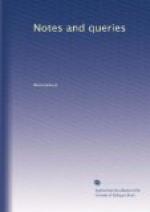to Ritson, he wrote another work, published in the
same year, viz. Three Pastorall Elegies of
Anander, Anytor and Muridella, entered to Joseph
Barnes, 28 May, 1692, of which I am not aware that
any copy is now in existence. These, with the
addition of Great Brittaines Sunnes-set, bewailed
with a Shower of Teares, at Oxford, printed by
Joseph Barnes, 1613, the fragment of which is in the
possession of Mr. Collier, appear, as far as I can
yet ascertain, to be the only known publications of
William Basse, with his name attached to them in full.
Other works, however, have been attributed to him
from the similarity of the initials,—but
most of them probably without much foundation; viz.
1. Scacchia Ludus: Chesse-play: a
poetical translation of Vida’s poem at the end
of Ludus Sacchiae, Chesse-Play, by W.B. 4to.
Lond. 1597; by Ritson. 2. A Helpe to Discourse;
or a Miscelany of Merriment, by W.B. and E.P. 2nd
edit. 8vo. Lond. 1620; by Mr. Malone. And
3. That which seemes Best is Worst, exprest in
a Paraphrastical Transcript of Iuuenals tenth Satyre.
Together with the Tragicall Narration of Virginius
Death interserted, by W.B. small 8vo. Lond.;
imprinted by Felix Kyngston, 1617, by Mr. Octavius
Gilchrist, who however rather leans to the opinion
of William Barkstead being the author, from the circumstance
of his having, as early as 1607, paraphrased, much
in a similar way, the interesting tale of Myrrha,
the mother of Adonis, from the 10th Book of the Metamorphoses.
(See Restitutu, vol. i. p. 41.)
Cole, in his MS. Collectanea for Athenae Cantabrigiensis, says:
“Mr. Knight, jun. shewed me a MS. written by William Basse, and corrected by him, in 4to., called Polyhymnia.—Dedication. To the Right Noble and vertuous Lady, the Lady Bridget, Countess of Lindsey, and Baroness of Eresbie and Ricot, in verse, with Verses to the Right Hon. Francis Lord Norreys, Earl of Berkshire (in his days). To the Right Hon. the Lady Aungier (then wife of Sir Thos. Wenman) upon her coming out of Ireland and return thither. To the Right Hon. the lady Viscountess Falkland, upon her going into Ireland, two Sonnets. The Youth in the Boat. Acrostics of the truly noble, vertuous, and learned Lady, the Lady Agnes Wenman; of the Lady Penelope Dynham; of Mrs. Jane Wenman. Verses on the Chapel of Wadham College consecration, St. Peter’s Day, 1613; on Caversham or Causham House; of Witham House, Oxfordshire, the house of a noble Knight, and favourer of my Muse; and Elegy on a Bullfinch, 1648; of the Four Mile Course of Bayaides Green, six times run over, by two famous Irish footmen, Patrick Dorning and William O’Farrell.—It contains about 40 leaves, much corrected, and at the end is ’L’Envoy’:—
“’Go,
sweet Polymnia, thanks for all your cost
And love to me;
wherein no love is lost.
As you have taught
me various verse to use,
I have to right
you to be a Christian Muse.’”




